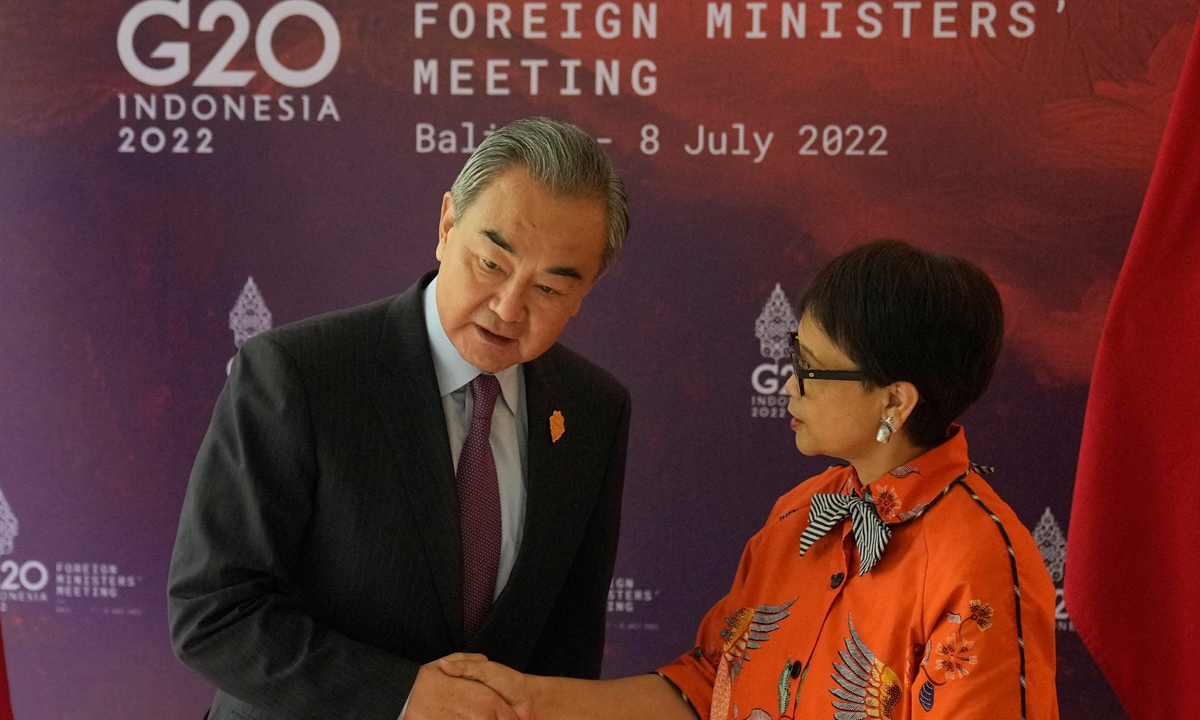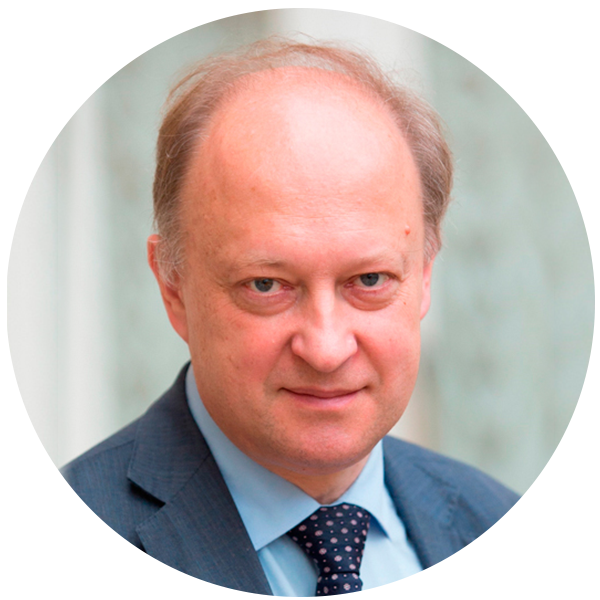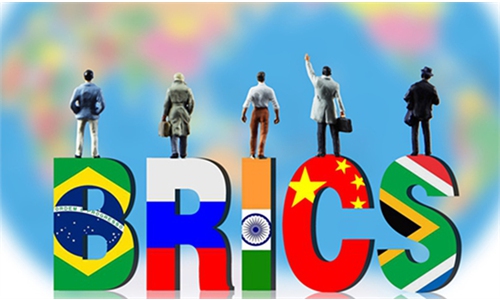G20 will not become an enlarged G7

Indonesian Foreign Minister Retno Marsudi (right) greets Chinese State Councilor and Foreign Minister Wang Yi during their bilateral meeting ahead of the G20 Foreign Ministers' Meeting in Nusa Dua on Thursday. Photo: AFP
The G20 Foreign Ministers' Meeting (FMM) is being held in Bali on Thursday and Friday. It is one of the most important events on the way to the G20 summit that the island will host on November 15-16. The official announcement discloses the overarching theme of the meeting - "Recover Together, Recover Stronger" - as well as the aim "to enhance further collaboration through dialogue to revive multilateralism in addressing global challenges."
This year, the FMM takes place under extremely challenging political circumstances resulting from the Russia-Ukraine conflict and, more generally, from Russia-West confrontation climbing to a new, unprecedented level. One cannot envy Russian Foreign Minister Sergey Lavrov: He is doomed to get an ice-cold treatment from his Western peers who stay firm in their intention to ignore him in Bali. Still, Russia will hardly be fully isolated at the FMM: Lavrov can count on a chain of bilateral consultations with his counterparts from several non-Western G20 countries including China, Mexico, South Africa and Brazil, as well as with the invited leaders of some international organizations.
However, the FMM intrigue is not limited to Russia's place within G20. The West comes to Bali more united than it has ever been since the end of the Cold War. The recent summits of G7, the North Atlantic Alliance and the European Union have demonstrated an exceptionally high degree of the Western cohesion. It is clear that the Western leaders have done their homework for the FMM and that they will actively try to advance their strategic goals at the meetings in July and in November.
Ideally, the West would like to turn G20 into a natural extension of G7, so that the Group of Seven liberal democracies could set the prime agenda for the 20 influential international actors, and through these actors - for an even larger international community. The desired agenda is much broader than the attitude to the Russia-Ukraine standoff, it is also about many other critical international issues, including the post-COVID recovery, multiple regional crises, resource management, climate change, global commons, and so on. If G7 could regain its former role as the rule-maker in global affairs, and if G20 would accept the role of a rule-taker, the world would get back to the unipolar model of the end of 20th century with US at the very top of the decision-making system and with the rest of G7 constituting the second tier of global governance.
However, these plans are not likely to work - neither at the forthcoming FMM and certainly not at the November G20 summit. The world today is simply too different from what it was in the end of last century; the balance of power between the West and "the Rest" has shifted dramatically in favor of the latter The reality is that G20 has never been and will never become an extended or an enlarged version of G7, despite a significant overlap of membership between the two groups. While G7 is an exclusive club of Western democracies (even India has not been invited to formally join the group), G20 is an inclusive and diverse gathering of major global economies.
The diverse composition of G20 makes it more difficult to reach consensus within this group than within a more homogeneous G7 or within any other Western forum or institution. At the same time, diversity is one of the main sources of G20 legitimacy that G7 or NATO clearly lacks. Diversity and representativeness are assets that the Group of 20 cannot easily relinquish. For instance, though non-Western members of G20 have various attitudes toward Russia's special military operation in Ukraine, they fully understand that expelling Moscow from the group or ostracizing Vladimir Putin would set a dangerous precedent within the group that they would like to avoid.
This is exactly why G20 focuses mostly not on divisive and potentially explosive matters of international security, but rather on the unifying agenda of global economy and finance. This is the agenda, with which the group came to the fore of world politics during the global financial crisis of 2008-2009, and these priorities have to be preserved in our difficult times. It is true that today security and development can hardly be separated from each other. However, it is more logical and more productive for G20 to work hand in hand with the United Nations Security Council rather than to try to replace the latter.
G7 might and probably should be an important source of new ideas for G20 on global development, but such an advisory and consultative role may be also claimed by the Shanghai Cooperation Organization, BRICS, APEC and many other similar institutions. For the West it would be better than not to try to impose a partisan G7 approach on a more inclusive G20 forum, but instead to consider mutual adjustments on trade, investments, international assistance, and so on and to attempt reaching a common denominator amid serious disagreements between the West and "the Rest." The announced bilateral meeting between Chinese State Councilor and Foreign Minister Wang Yi and US Secretary of State Antony Blinken on the margins of the FMM is a positive signal that might reflect a change of views in Washington on how far the US should go in its confrontation with Beijing, provided that the meeting will not be limited to US trying to convince China to move to the "right side of history" and to abandon its strategic partnership with Russia.
The author is a director general of the Russian International Affairs Council. opinion@globaltimes.com.cn


